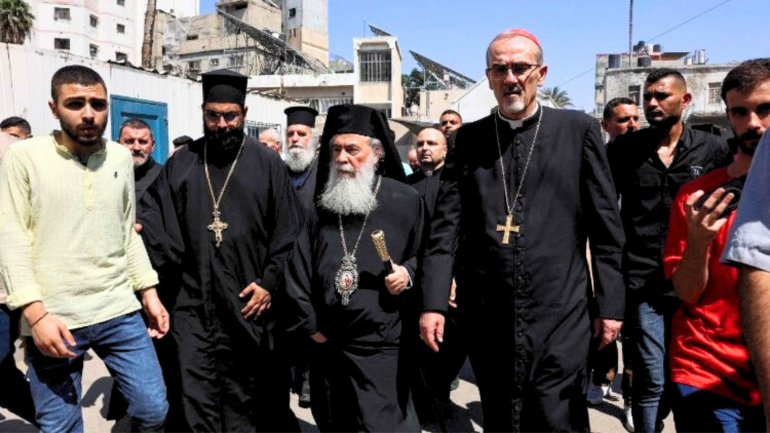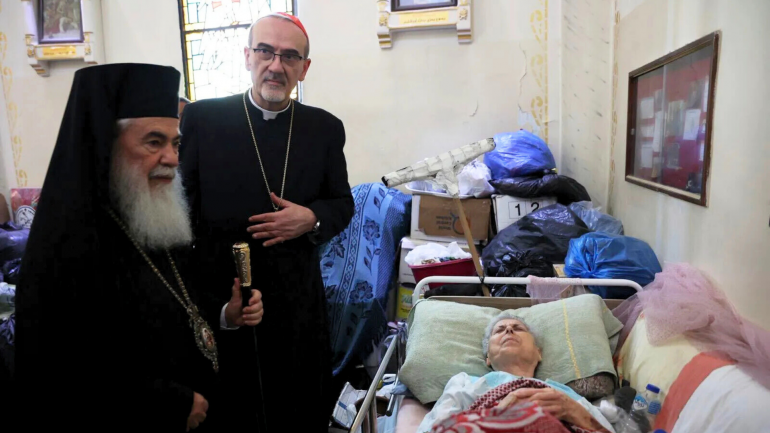Gaza is no different from Nagasaki
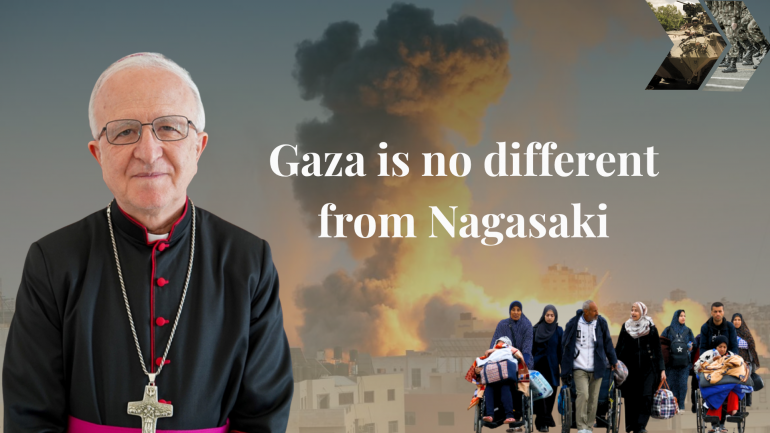
For the past 22 months, the war in the densely populated Gaza Strip has dominated headlines worldwide. Since its outbreak on October 7, 2023, at least 61,499 Palestinians have been killed, including 222 from starvation, 101 of them children. Another 153,575 have been injured.
To gain a clearer picture of the situation in the region, Radio Veritas Asia reached out to William Hanna Shomali, Patriarchal Vicar for Jerusalem and Palestine.
Born in 1950 in Beit Sahour, a Palestinian town east of Bethlehem, Bishop Shomali was ordained a priest of the Latin Patriarchate at the age of 22, a unique jurisdiction serving Latin Catholics across Israel, Palestine, Jordan, and Cyprus. Over the past five decades, he has held numerous roles, from rector of the Latin Patriarchate Seminary in Beit Jala to chancellor of the Patriarchate.
Today, he serves as one of the Latin Patriarchate’s four active auxiliary bishops, leading as General Vicar and Patriarchal Vicar for Jerusalem and Palestine, a role he now fulfils under the dark shadow of war.
In this email interview, Bishop Shomali shared with RVA writer Lavoisier Fernandes the tremendous toll of the war, the unmet humanitarian needs, the Church’s response, and the hope that persists in the midst of so much suffering.
This interview has been edited for length and clarity.
Excerpts:
What is your assessment of the current situation in Gaza?
The human toll in Gaza is beyond words. For those living there, the situation is apocalyptic; it feels like the end of their world. For nearly two years, they have lived, slept, and breathed violence, fear, and anxiety. Every day brings new trauma, and the suffering runs deep and wide.
Nearly 60,000 lives have been lost, including thousands of children. Countless families have been displaced, and malnutrition is widespread. The destruction of homes, infrastructure, and even the natural environment has left scars that will endure for generations.
Just a few days ago, on August 9, we marked the 80th anniversary of the bombing of Nagasaki, where about 74,000 people were killed. The comparison is sobering. Gaza is not far from Nagasaki, not only in the number of victims, but also in the long-term damage to its people, sea, and land. The trauma, both physical and psychological, will remain for decades.
We are witnessing a humanitarian catastrophe that demands urgent attention and decisive action. The people of Gaza need not only humanitarian aid, but also a ceasefire and a clear path toward lasting peace. The world must not look away.
What are the immediate humanitarian needs in Gaza that are not being addressed adequately, and how is the Church working to meet those needs in the midst of the violence?
The most urgent needs in Gaza are the most basic for human survival: food, medicine, clean water, shelter, and safety. These are not luxuries, they are fundamental rights, yet they remain tragically out of reach for most people.
Children have been out of school and university for nearly two years, robbing an entire generation of education and stability. Hospitals are barely functioning, lacking fuel, electricity, and medical supplies. Many families are living in tents, with no sense of security.
In this dire context, the Church continues to do what it can. We offer spiritual support, humanitarian aid where possible, and a constant presence of prayer and solidarity. Our institutions provide food parcels, medical assistance, and pastoral care, but the needs far exceed our capacity.
How has the war shaped the Church’s mission in the Holy Land?
It has strengthened our commitment to being a voice for the voiceless, a source of comfort for the afflicted, and a bridge for peace and reconciliation.
His Beatitude Patriarch Pierbattista Pizzaballa has personally visited Gaza twice, despite the risks, to meet with the community, assess their needs, and offer what they desperately needed most: hope. His presence was a powerful sign that they are not forgotten, that the Church stands with them in their pain.
We continue to pray, advocate, and act, trusting that even in the darkest moments, peace can still become a reality.
About the shell attack on the only Catholic church in Gaza, whose pastor Pope Francis used to call every day before his passing - how do you see this event?
The attack on Holy Family Church, which resulted in the death and injury of several people sheltering there, was a devastating blow. This sacred space had become a refuge for many. Its partial destruction has left not only physical damage, but also a deep sense of insecurity among those who had found safety within its walls.
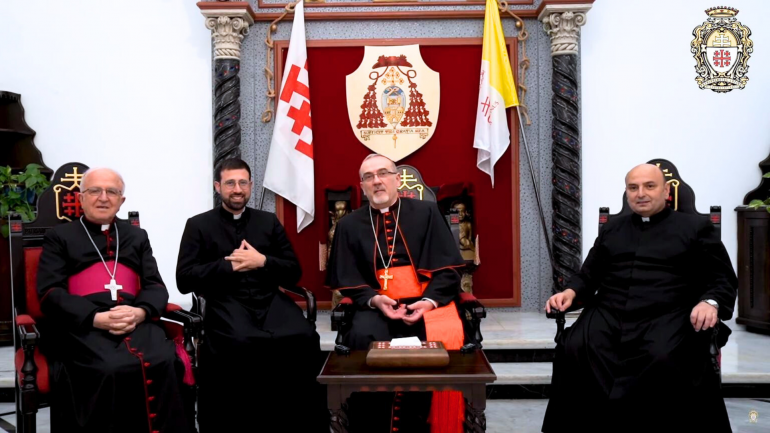
The Holy See has called for peace in the region on numerous occasions, including advocating for a two-state solution. What is your take on that?
The Holy See has consistently called for peace in the region, and the two-state solution remains the only legitimate and widely accepted path forward, supported by nearly all countries except the United States and Israel. Although it may seem unrealistic in the current climate, it is still the most viable framework for achieving justice, security, and coexistence.
To make this solution possible, a mutually agreed exchange of territories between Israel and a future Palestinian state could be considered. There is room for everyone in this Holy Land, Jews, Christians, and Muslims alike. Jerusalem, in particular, should be a shared city, open to the three religions and two peoples, reflecting its sacred significance and universal heritage.
You mentioned earlier that the world must not look away. What do you think the international community should do to bring peace to this region?
The international community should:
- Recognize the urgency of peace and resist normalizing prolonged conflict.
- Support diplomatic initiatives that prioritize human dignity and mutual recognition.
- Provide humanitarian aid while also advocating for long-term, structural solutions.
- Promote dialogue and reject extremism on all sides.
Peace is not only a political goal, it is a moral imperative. The Church will continue to be a voice for reconciliation and a witness to the possibility of living together in mutual respect and harmony.
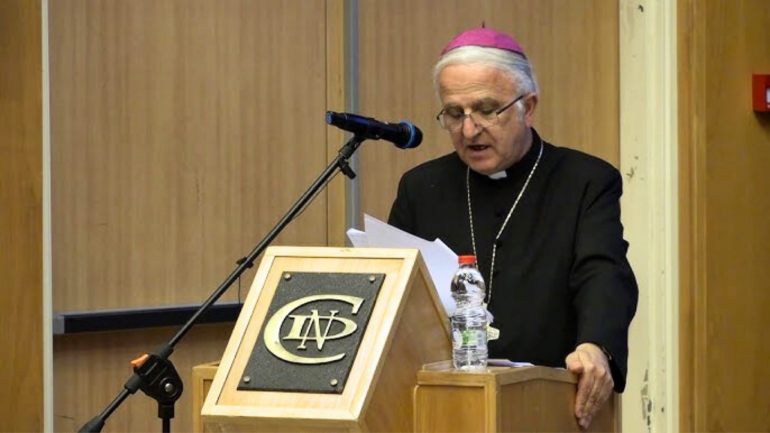
As an Auxiliary Bishop in Jerusalem, you are deeply connected with both Palestinians and Israelis. How do you navigate these deeply entrenched divisions in your ministry?
As Auxiliary Bishop, my pastoral responsibility covers Jerusalem and the Palestinian territories, not Israel. However, I am occasionally invited to participate in interreligious meetings, often held via Zoom, and I gladly attend. These encounters are important opportunities to foster dialogue, mutual understanding, and peace.
I am granted a special visa that allows me to live and work from Jerusalem. This is essential, as it gives me a certain freedom of movement; without it, I could not fulfill my ministry. Yet even with this privilege, travel is far from easy. Just yesterday, a return trip from Bethlehem took me two hours instead of the usual thirty minutes. The closure of checkpoints between Palestinian cities makes movement difficult and unpredictable.
Navigating these divisions requires patience, humility, and a constant commitment to being a bridge between communities. The Church’s mission is to be present to all, especially the suffering, and to witness to the possibility of peace and coexistence, even when the path is narrow and steep.
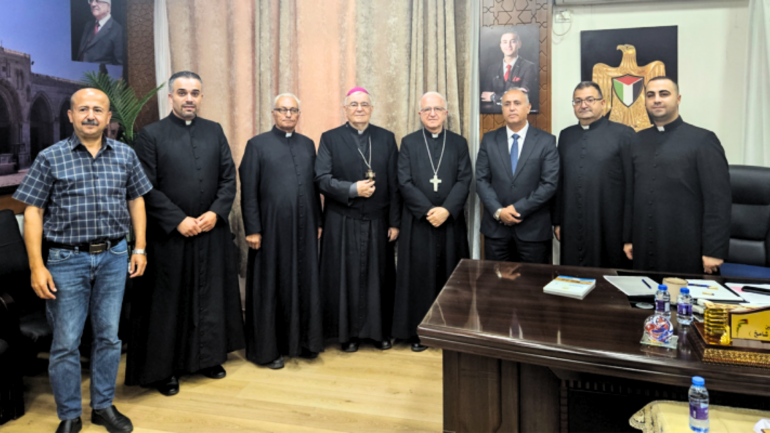
What role do you believe the international Church community can play in advocating for peace?
The international Church community has a vital role in advocating for peace in Gaza and throughout the Holy Land. One of its most powerful contributions is to press for the implementation of the two-state solution, which remains the only legitimate and widely supported path toward a just and lasting peace.
Catholics around the world are already showing deep solidarity with those suffering in Gaza and with needy families across the Holy Land. This solidarity is deeply felt and greatly appreciated. It reminds us that we are not alone, that the Body of Christ is truly one, suffering together, hoping together, and working together for peace.
In this Jubilee of Hope, amid the region’s ongoing suffering, loss of life, and widespread destruction, do you see any real hope for peace?
Yes. Even in the midst of immense suffering and destruction, we see a ray of hope, because hope comes from God. We believe that prayer is always heard, even if the divine response seems delayed. History teaches us that peace can emerge unexpectedly, as the fruit of persistent prayer and faithful endurance.
After two devastating world wars, Europe witnessed the birth of the European Union, a remarkable achievement and a blessing that many consider an answer to the prayers of the faithful. Similarly, the fall of the Berlin Wall came when few expected it, proving that peace can break through even the hardest walls.
In the Holy Land, our hope is nourished by the solidarity of the Catholic Church worldwide: the humanitarian aid sent to Gaza, the pastoral visits of the Patriarch, the many calls we make to check on the well-being of our people, all these are signs of love and communion. The daily calls of Pope Francis in the past, and the ongoing appeals for peace and the release of hostages by Pope Leo today, are powerful reminders that the Church never abandons her children.





